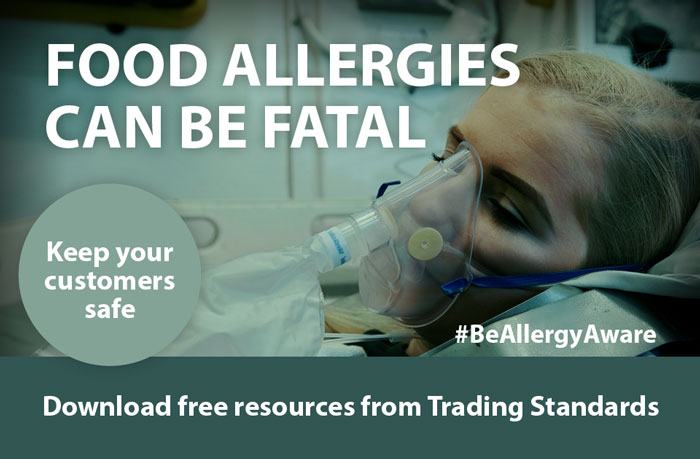With new legislation on allergen labelling coming into force this month, the Chartered Trading Standards Institute (CTSI) is hosting a campaign to inform businesses of their responsibilities to label food correctly.
The Be Allergy Aware campaign was created by the Greater Gwent Food Group – a partnership between Blaenau Gwent, Caerphilly, Monmouthshire, Newport City and Torfaen councils – with the support of the Food Standards Agency (FSA). It includes a handy factsheet for businesses, a series of posters in several languages reminding customers to notify staff of any allergies they may have, and an in-depth information video explaining the risks of improperly labelled food.
It urges businesses to “double-check, never guess” whether the food they sell contains ingredients that may be allergens, and whether their customers have any food allergies or intolerances.
The campaign arrives ahead of the implementation of ‘Natasha’s Law’ on October 1st, which will require all food businesses to provide full ingredient lists and allergen information on foods pre-packaged for direct sale in the UK.
The law is named after Natasha Ednan-Laperouse, a 15-year-old who tragically died after suffering an allergic reaction to a baguette that contained sesame seeds but which did not declare allergens on its packaging.
The Natasha Allergy Research Foundation said:
“We are delighted to see the Greater Gwent Food Group launch a multi-lingual resource to assist food businesses in preparing for compliance with Natasha’s Law coming into effect in less than a month. It captures the essence of the work our charity has done by reinforcing a key message of ‘Never Guess, Be Safe Not Sorry, Be Allergy Aware’ and we are confident this tool will be instrumental in creating awareness for staff within local business by creating an understanding of the importance of food allergy safety in saving lives.”
The 14 allergens that must be declared by law when used as ingredients are:
1. Celery
2. Cereals containing gluten
3. Crustaceans
4. Eggs
5. Fish
6. Lupin
7. Milk
8. Molluscs
9. Mustard
10. Nuts
11. Peanuts
12. Sesame seeds
13. Soya
14. Sulphur dioxide
While Natasha’s Law has been welcomed by campaigners, consumer groups and regulators, recent research has highlighted a worrying lack of awareness on the part of the food industry about the new requirements. Standards organisation GS1 found that eight in 10 food business owners feel unprepared for the new regulations, while four in 10 have never heard of Natasha’s Law.
David Pickering, CTSI Lead Officer for Food Safety, said:
“CTSI welcome the introduction of the requirement to provide consumers with information on labels about allergenic ingredients on a wider range of food.
“This additional information will enable consumers to make safer informed choices and whilst it may be a challenge for some food businesses, they can seek advice from their local trading standards service on this important issue.”
Dilys Harris, Senior Trading Standards Officer, Caerphilly County Borough Council, on behalf of the Greater Gwent Food Group said:
“We are proud to launch this valuable resource on food allergens which has been produced with the support of the FSA and Trading Standards Wales. It will be used by local authorities across Wales, England and Northern Ireland and is suitable for food businesses, food law enforcement officers and educational establishments.
“We aim to promote the importance of clear, accurate food information that consumers can trust and the supply of safe food’.”
Nathan Barnhouse, Director of the FSA in Wales said:
“Food hypersensitivity is a priority for the FSA and our ambition is for the UK to become the best place in the world for people living with food hypersensitivities.
“The upcoming changes to labelling requirements for prepacked for direct sale (PPDS) food are a huge milestone for people living with food allergies and will help protect them by providing potentially life-saving allergen information on the packaging.”

